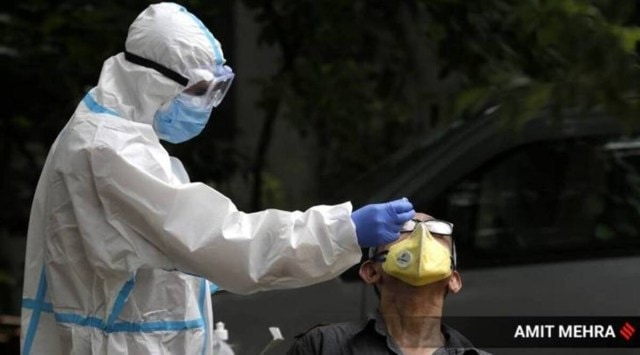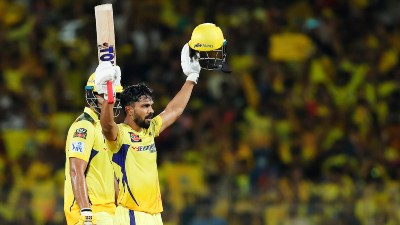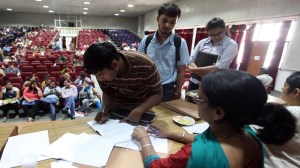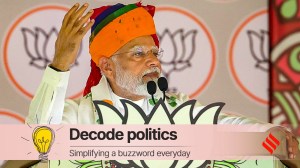- India
- International
Delhi: Covid test prices slashed, most pvt labs working with govt yet to come on board
🔴 Last Thursday, the Delhi government had slashed prices for the RT-PCR test to Rs 200 for samples collected by the government and Rs 300 for samples collected by laboratories at the behest of the government.
 The DDMA has also issued certain guidelines for labs for carrying out tests, and said that strict action will be taken against those found violating the norms. (File)
The DDMA has also issued certain guidelines for labs for carrying out tests, and said that strict action will be taken against those found violating the norms. (File)Only 25 of the 70 private laboratories in Delhi that were conducting RT-PCR tests for the government have so far consented to the lower prices set a week ago, with the government having to extend the deadline to February first week for others to join.
Last Thursday, the Delhi government had slashed prices for the RT-PCR test to Rs 200 for samples collected by the government and Rs 300 for samples collected by laboratories at the behest of the government. The government had been paying private labs Rs 300 and Rs 400 respectively since August last year, when the prices were last revised.
“The deadline for laboratories to consent to the revised prices offered by the government for testing has been extended to February first week. By then, we hope that almost all labs will join,” said a senior government official.
A majority of Delhi’s quoted 3 lakh RT-PCR testing capability comes from private laboratories that were either set up or expanded during the last two years. Government laboratories in Delhi’s hospitals, including the capacity of central labs such as those at the National Centre for Disease Control and National Institute of Biologicals-Noida, add up to only about 8,500 tests a day.
The official added, “This time, instead of asking labs to tell us the peak capacity, we have asked them to share details of the machines that they have, the manpower, etc, to calculate how many tests can realistically be done in a day. Usually, the capacity drops when there is a surge in cases because lab employees start falling sick, there is wear and tear of the machines when they are run continuously, and sometimes there is a shortage of kits.”

Delhi’s testing capacity had dropped by a third of its 1 lakh peak capacity during the delta wave in April-May last year.
The labs that haven’t sent in their consent to the government, however, still have to charge the revised prices to people directly coming to them.
In the same order last week, the government had also slashed the prices to Rs 300 for people directly giving samples at a private lab or hospital and Rs 500 if the samples are collected from home. The prices were previously fixed at Rs 500 for lab collection and Rs 700 for home collection.
“Even in the worst of situations, Delhi can do around 1.75 lakh to 2 lakh tests perhaps with the capacity of all the labs,” the official said.
Even as the government remains hopeful that all the labs will join, labs remain dissatisfied as they get paid lower rates and have outstanding bills. “I have already invested in the machines, paid my technicians and microbiologists, paid for the maintenance of the lab and machines. But I am yet to get paid by the government; my survival is at stake. The outstanding bills are worth crores,” said the owner of a private laboratory in the city.
The lab said they have stopped collecting samples from home unless it is extremely close to them and will stop conducting rapid antigen tests once the existing lot of kits gets over. “I buy the RAT kits for Rs 95, and the government is asking us to conduct the tests at Rs 100. How can I? I will stop once my current batch is over; people can do it at home,” the owner said.
The owner of another Delhi lab said, “Now it is just charity, I am paying out of my pocket to conduct RT-PCR tests. We are focussing on other tests now.”
On the cost concerns raised by private labs, another government official said: “When purchased in bulk, the RNA extraction kits are available for Rs 18 or Rs 19 and the RT-PCR test kits for Rs 23 to Rs 24. Yes, there are other costs involved in managing the lab and the human resource, but the labs can do it. Some of the labs in Delhi have taken up rate contracts for government testing in other states like Madhya Pradesh and Jharkhand for Rs 180 or so. Of course, they will get high volumes there, but what is the problem then in conducting the tests for Rs 200 to Rs 300 in Delhi?”
Meanwhile, the price cut for RT-PCR as well as rapid antigen tests last Thursday did not lead to an increase in the number of people getting tested. There was a huge increase in the number of people getting the tests when the government had reduced the prices significantly to Rs 800 per test for samples given at labs and Rs 1,200 for home collection in November 2020.
“People who can pay Rs 300, can pay Rs 500 as well for the test. For the others, the government collection centres are already there,” said the second lab owner quoted above.
The second government official also agreed that there was no increase in the number of tests when prices were reduced; the numbers increased from the previous dip because the ICMR urged the governments to continue collecting samples from the community after the January 10 guidelines did away with testing for asymptomatic people on demand.
Random testing restarted
With restrictions being eased at markets and malls from Friday, the district administrations have restarted random testing at Metro stations and public places. “The districts have also strengthened enforcement at markets to maintain social distancing and Covid appropriate behaviour. Random tests are being conducted to curb the spread of the virus,” said a senior district official, on condition of anonymity. Random testing was stopped from January 12 after the ICMR guidelines directed that tests be done only for symptomatic and co-morbid patients who have come in contact with positive cases. Meanwhile, Delhi recorded 4,044 fresh cases on Friday, just over 200 cases short of the previous day’s 4,291 when the tally dropped below the 5,000-mark for the first time since the current surge began. The positivity rate stood at 8.60%, with just 47,042 tests conducted. The capital also recorded 25 deaths. (ENS)
Apr 24: Latest News
- 01
- 02
- 03
- 04
- 05








































